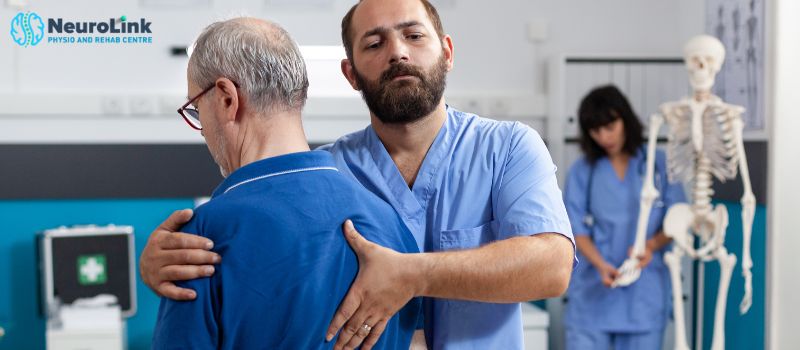Spinal cord injuries (SCIs) can be life-altering, impacting a person’s mobility, sensory functions, and overall quality of life. Physiotherapy plays a crucial role in the rehabilitation process, aiming to restore function, improve mobility, manage pain, and enhance independence. NeuroLinkRehab is at the forefront of innovative spinal cord injury physiotherapy treatments, offering comprehensive and personalized care to maximize recovery potential.
Understanding Spinal Cord Injuries:
SCIs can result from various causes, including traumatic accidents, falls, sports injuries, or medical conditions like spinal cord compression. The severity of the injury determines the extent of impairment, ranging from partial loss of function to complete paralysis. Injuries can affect motor skills, sensory perception, bowel and bladder control, and even respiratory function.
The Role of Physiotherapy in SCI Treatment:
Physiotherapy is a cornerstone of SCI rehabilitation, focusing on:
-
Mobility Enhancement: Physiotherapists develop tailored exercise programs to improve strength, flexibility, and balance. This may include gait training, wheelchair mobility skills, and adaptive equipment usage.
-
Functional Independence: Therapy aims to restore activities of daily living (ADLs) such as dressing, bathing, and transferring. Techniques like task-specific training and assistive devices promote independence.
-
Pain Management: SCI patients often experience neuropathic pain, muscle spasms, and joint stiffness. Physiotherapy incorporates modalities like massage, stretching, and heat therapy to alleviate pain and discomfort.
-
Respiratory Support: For individuals with higher-level injuries impacting respiratory muscles, physiotherapy includes breathing exercises, chest physiotherapy, and pulmonary function training.
-
Neurological Recovery: Techniques such as neurodevelopmental therapy (NDT), proprioceptive neuromuscular facilitation (PNF), and functional electrical stimulation (FES) target neuroplasticity and motor relearning.
Innovative Approaches at NeuroLinkRehab:
NeuroLinkRehab integrates cutting-edge technologies and evidence-based practices to optimize SCI rehabilitation:
-
Robot-Assisted Therapy: Utilizing robotic devices like exoskeletons and robotic gait trainers, patients engage in repetitive movements to improve motor function and relearn walking patterns.
-
Virtual Reality (VR) Rehabilitation: Immersive VR environments enhance therapy sessions, stimulating sensory feedback, promoting motor planning, and fostering neurocognitive skills.
-
Electrical Stimulation: Transcutaneous electrical nerve stimulation (TENS) and functional electrical stimulation (FES) target muscle activation, improve circulation, and facilitate muscle re-education.
-
Aquatic Therapy: Hydrotherapy in specialized pools offers buoyancy, resistance, and reduced gravitational stress, aiding in mobility, muscle relaxation, and cardiovascular fitness.
-
Biofeedback and Neurofeedback: Monitoring physiological responses such as muscle activity, heart rate variability, and brainwave patterns enhances self-awareness and promotes neuromuscular control.
Patient-Centered Care:
At NeuroLinkRehab, every treatment plan is individualized based on the patient’s unique needs, goals, and medical history. A multidisciplinary team comprising physiotherapists, occupational therapists, speech therapists, and psychologists collaborates to provide holistic care and address the physical, emotional, and social aspects of recovery.
Measuring Progress and Outcomes:
Objective assessments, functional evaluations, and outcome measures track progress and determine the effectiveness of treatment interventions. Regular reassessments allow for adjustments to therapy goals, techniques, and intensity levels, ensuring ongoing improvement and optimal recovery outcomes.
Empowering Patients and Caregivers:
Education and training are integral components of SCI physiotherapy at NeuroLinkRehab. Patients and caregivers receive guidance on home exercises, injury prevention strategies, adaptive techniques, and community resources to promote long-term well-being and self-management.
Advancing Research and Innovation:
NeuroLinkRehab is committed to advancing SCI rehabilitation through research collaborations, clinical trials, and continuous professional development. By staying updated on emerging therapies, technologies, and best practices, the center remains at the forefront of excellence in spinal cord injury physiotherapy.
Conclusion:
Spinal cord injury physiotherapy at NeuroLinkRehab is a comprehensive, patient-centered approach that combines expertise, innovation, and compassion to empower individuals on their journey to recovery.



